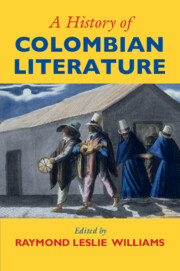Book contents
- Frontmatter
- Contents
- Notes on contributors
- Preface
- Introduction
- PART I LITERATURE AND SOCIETY IN COLOMBIA
- PART II COLOMBIAN CULTURE AND SOCIETY IN REGIONAL CONTEXTS
- PART III BEYOND THE BOUNDARIES
- AFTERWORDS
- 21 Colombian literature: national treasure or fraud?
- 22 Colonial legacies and Colombian literature: postcolonial considerations
- Index
21 - Colombian literature: national treasure or fraud?
from AFTERWORDS
Published online by Cambridge University Press: 05 June 2016
- Frontmatter
- Contents
- Notes on contributors
- Preface
- Introduction
- PART I LITERATURE AND SOCIETY IN COLOMBIA
- PART II COLOMBIAN CULTURE AND SOCIETY IN REGIONAL CONTEXTS
- PART III BEYOND THE BOUNDARIES
- AFTERWORDS
- 21 Colombian literature: national treasure or fraud?
- 22 Colonial legacies and Colombian literature: postcolonial considerations
- Index
Summary
Introduction
Often, and for a variety of purposes, the nineteenth century in the Americas is considered to be the period of the rise and consolidation of nations. To a large extent, after the wars of independence, each country developed a slow process of formation of legal and social mechanisms that constituted nations and national consciousness. In this packet of shaping issues were national literatures, which had national authors and their areas of influence, but each of these national literatures was a fragment of a larger corpus governed by the fact that they were written in the same language, Spanish, regardless of their geographic origin.
If we were to look at the path taken by literature written in Spanish, each can be seen as a group of local literatures that created its own tradition as a result of particularities in its local production, dissemination, and circulation in each country, alongside a production that was common to all because of those most renowned authors. If we were to imagine a pyramid as national literature, each renowned writer in each country would be living at the cusp.
From above, from an aerial perspective, we can see literature in Spanish as a set of pyramids of different sizes, each with its own production and cusps of most prominent writers who can be seen from the neighboring pyramids. No pyramid is the same size as the other, but three have played a greater role than the rest. During the first half of the twentieth century, the leading publishers of books in Spanish were located in Spain (Madrid and Barcelona), Mexico, and Buenos Aires. Therefore, what mainly came to Bogotá, Caracas, or Lima, for example, were books written by Spanish, Mexican, and Argentine authors.
An assessment can be made of each set in two different contexts: The first refers to the way in which each country's own literary production is judged, and the second, how others see them. With regard to Colombia, Colombian evaluations of their own literature have fluctuated sharply over time. Among them, there is a prominent assessment – an article published in 1960 by Gabriel García Márquez titled “La literatura colombiana, un fraude a la nación” (Colombian Literature: A Fraud to the Nation). In this chapter, I review the evaluations that have been published in Colombia when reflecting on our own literature.
- Type
- Chapter
- Information
- A History of Colombian Literature , pp. 457 - 475Publisher: Cambridge University PressPrint publication year: 2016



